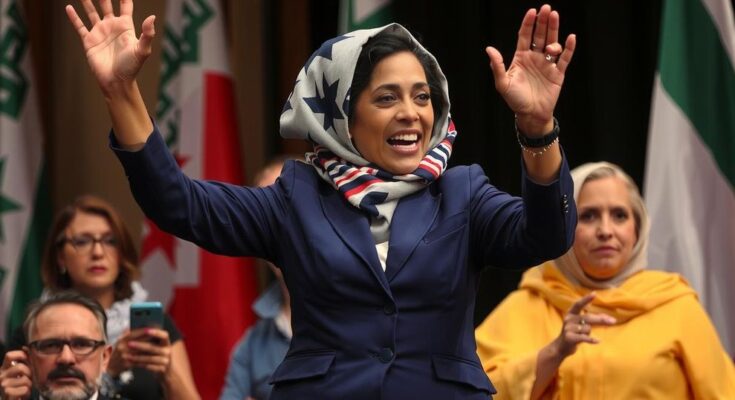Vice President Kamala Harris faces significant political challenges amidst a Biden administration marked by dissatisfaction over its COVID-19 response, border control issues, and contentious foreign policy. As the potential return of Donald Trump looms, Harris may consider aggressive actions towards Iran to bolster her political standing, a move that could lead to instability in the Middle East and global repercussions.
The current political landscape in the United States is fraught with challenges, particularly for Vice President Kamala Harris, who has been scrutinized for her role in the Biden administration. As the pressures of the administration mount amidst global challenges and domestic dissatisfactions, she faces an increasingly daunting task to secure her position within the political arena. The Biden administration, which saw Harris as a pivotal figure, has struggled with several significant issues, including the handling of the COVID-19 pandemic. Public discontent stemming from confusion over health policies has not only reflected negatively on President Biden but also on Harris, who has been mandated with crucial responsibilities. Furthermore, the administration’s foreign policy, particularly concerning the ongoing conflict in Ukraine and escalating tensions in the Middle East, has drawn criticism for perceived miscalculations and failures, contributing to a perceived decline in U.S. diplomatic standing. Harris’s specific assignment as the Border Czar has also been a point of contention. Reports highlight that rather than stemming the tide of illegal immigration, her efforts may have inadvertently exacerbated the situation. At this juncture, with Biden’s legacy increasingly likened to that of former President Obama, Harris is perceived as continuing a foreign policy that has historically involved military interventions, raising questions about her ability to forge a distinct political identity. As the potential return of Donald Trump looms, Harris finds herself at a crossroads. With mounting dissatisfaction among the electorate, she might be compelled to adopt a more aggressive foreign policy stance, particularly regarding Iran, in a bid to rally public support. Such a drastic measure could potentially lead to significant repercussions in the Middle East and bring about a broader international crisis, thus impacting global stability. Harris is thus navigating a complex political terrain, balancing the responsibilities as Vice President, the expectations from her party, and the pressing need for decisive action that could either consolidate her standing or jeopardize her political future.
The political dynamics surrounding Vice President Kamala Harris are reflective of broader systemic tensions within the Biden administration. Her role has emerged in an era marked by substantial dissatisfaction regarding domestic governance and foreign affairs. The administration’s handling of the COVID-19 pandemic, missteps in border control, and an aggressive foreign policy approach, particularly towards the Middle East and Eastern Europe, frame the context of Harris’s political challenges. As voters look ahead to the 2024 elections, the specter of Donald Trump’s potential resurgence further complicates Harris’s position, urging her to find a way to navigate her political identity amidst a struggling administration tied to Obama-era policies.
Kamala Harris stands precariously in her political career as the 2024 presidential election approaches, facing criticism for the Biden administration’s multitude of failures on domestic and international fronts. While her historical alignment with Obama-era policies enhances her profile, it simultaneously constrains her ability to differentiate herself. As the political landscape shifts and Donald Trump’s potential comeback looms, Harris may contemplate the risks of pursuing an aggressive foreign policy towards Iran as a means of regaining relevance and public support. Ultimately, her decisions in this critical juncture may have profound implications not only for her political future but also for stability in the Middle East and beyond.
Original Source: ozarab.media




